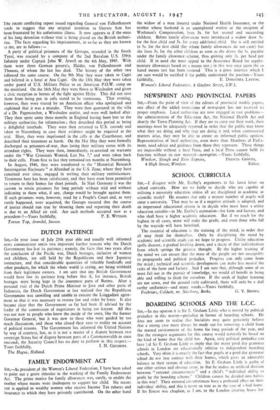SCHOOL CURRICULA
Sm,—I disagree with Mr. Exclby's arguments in his latest letter on school curricula. How are we fairly to decide who are capable of utilising a university education unless all are disciplined in academic or scientific study? He assumes that only a minute number of pupils will enter a university. That may be so if a negative attitude is adopted, and an impersonal educational system is to decide who must have a utility education suitable—in Mr. Exelby's estimation—for farm and factory, and who shall have a higher academic education. But if we reach for the highest in all cases, more will make the grade, and even those who fall by the wayside will have benefited.
The essential of education is the training of the mind, in order that all may think for themselves. Only by disciplining the mind by academic and scientific study can we hope to progress. Utility education spells disaster, a gradual levelling down, and a decay of that individualism from which springs the greatest thought. By the higher training of the mind we can ensure that the mass of the people are not susceptible to propaganda and political prejudice. Progress can only come from the mind ; technical and scientific development can make less menial the tasks of the farm and factory. And I am sure that, although some of us must fall out in the pursuit of knowledge, we would all benefit in being able and willing to think for ourselves If the seeds of higher learning are not sown, and the ground early cultivated, there will only be a dull earthy uniformity—and many weeds.—Yours faithfully,
Foxbriars, Coldash, nr. Newbury, Berks. G. V. BROWN.


































 Previous page
Previous page